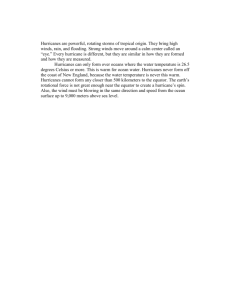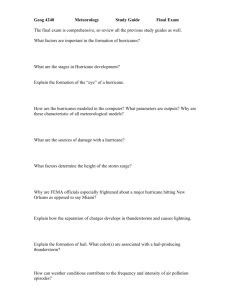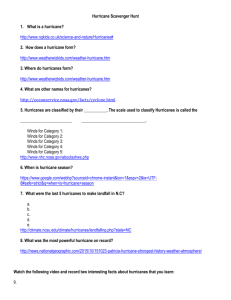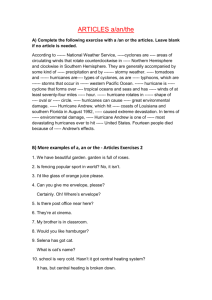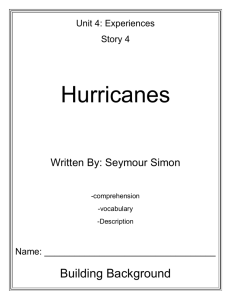How do hurricanes impact the environment? - i21intel
advertisement
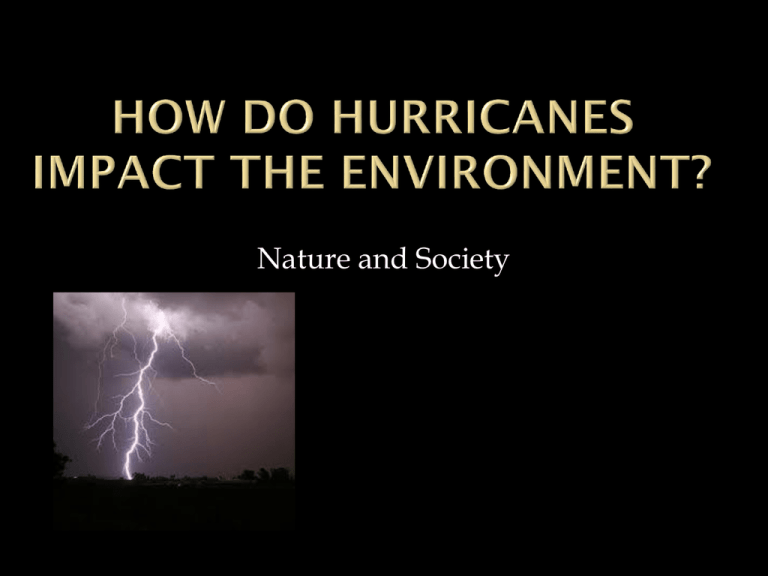
Nature and Society Nature hurricane winds strip vegetation and topple trees, a large pulse of litterfall (fallen leaves, branches, and other natural debris) www.hurricanescience.org/society/impacts/environmentali mpacts/terrestrialimpacts/ Hurricane, vegetation, Society Destroys homes, bridges, buildings destruction of vegetation, crops, orchards, and livestock, or indirectly through long-term losses of soil fertility http://www.hurricanescience.org/society/impacts/ rainfallandinlandflooding/ Impact on Nature : Benefits Hurricanes provide ecological benefits to tropical and sub-tropical environments. Rainfall gives a boost to wetlands and flushes out lagoons, removing waste and weeds. Hurricane winds and waves move sediment from bays into marsh areas, revitalizing nutrient supplies. Ecological, tropical, sub-tropical, wetlands, lagoons A hurricane is a huge storm! It can be up to 600 miles across and have strong winds spiraling inward and upward at speeds of 75 to 200 mph. http://www.weatherwizkids.com/weatherhurricane.htm Hurricanes gather heat and energy through contact with warm ocean waters. Evaporation from the seawater increases their power. Hurricanes rotate in a counterclockwise direction around an "eye" in the Northern Hemisphere and clockwise direction http://www.weatherwizkids.c in the Southern Hemisphere. om/weather-hurricane.htm What causes Hurricanes In recent years, the relationship between hurricanes and climate change has become a source of public interest, significant scientific debate, and a focus for current research environment.nasa.gov/od/globalwarming /a/hurricanecauses.htm Human activities such as deforestation and greenhouse gas emissions from a wide range of industrial and agricultural processes are contributing to those temperature changes at a greater rate today than in the past http://www.hurricanescience.org/science /science/climate/ Weather Maps 1) WEATHER MAPS indicate atmospheric conditions above a large portion of the Earth's surface. Meteorologists use weather maps to forecast the weather. http://www.spc.noaa.gov/products/wwa / http://www.weather.gov/ www.nhc.noaa.gov/EPA v/EPA http://www.nhc.noaa.gov/EPAC_Track_chart.pdf http://www.nco.ncep.noaa.gov/pmb/nwprod/analysis/ http://weather.cod.edu/models/ When does hurricane season start? The Atlantic hurricane season is from June 1 to November 30, but most hurricanes occur during the fall months. The Eastern Pacific hurricane season is from May 15 to November 30. (Below is a graphic that shows you when hurricanes are most active across parts of the world.) http://weather.cod.edu/models/
